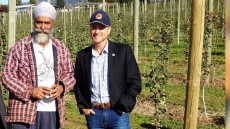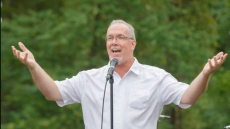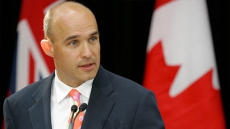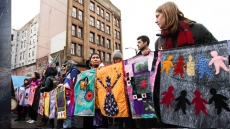TORONTO — Canadians overwhelmingly find Remembrance Day as relevant today as when it began nearly a century ago, but are split on whether younger generations properly appreciate and honour the country's veterans, according to a new survey released days before the ceremony.
The poll commissioned by Historica Canada found that 82 per cent of Canadians believe the annual tribute is as important now as it was shortly after the First World War.
Only slightly more than half (54 per cent), however, feel today's youth "do a good job" of honouring veterans, and slightly fewer than half (46 per cent) think young people understand the sacrifices of those who have died in conflict.
Even those under 35 are torn, with only 54 per cent saying young people recognize veterans' sacrifices — in itself a sign of engagement, Historica Canada's president said.
"When the answer among youth themselves is split as to whether they sufficiently care or not, if you're saying 'Yeah, I don't actually know if I care as much as I should,' in effect you're really saying, 'I do care because I've taken the trouble to think about that,'" Anthony Wilson-Smith said.
Overall, the importance Canadians attribute to the Nov. 11 commemoration has risen slightly in the decade that Historica Canada has been polling on the topic, Wilson-Smith said.
"The further that we get from (the Second World War)...the more reason there would seem to be for interest to lessen, but actually I think there's a tremendous awareness among all Canadians that our veterans from that war in particular are now generally in their 90s, it's an open question as to how much longer we will have them and their memories and the ability to celebrate them while they're here."

Wearing a poppy remains the most popular way for Canadians to mark the event, with 79 per cent of respondents saying they will don one of the traditional pins.
More than 77 per cent say they will observe two minutes of silence at 11 a.m. on Remembrance Day, and 32 per cent say they will attend a service.
But many say they would support other ways to pay tribute to those who have fought for their country. Eighty per cent say Canada should build a memorial similar to the Vietnam War monument in Washington, D.C., which would bear the names of all Canadian military personnel who died in combat during modern times.
And the vast majority (91 per cent) believe Canada should do more to honour its veterans.
Support for making Remembrance Day a national holiday has remained steady since 2012 at 85 per cent. While it is currently a federal statutory holiday, only six provinces deem it a day off.
But some believe the switch would turn Remembrance Day into another holiday spent shopping or socializing and detract from the date's significance.
One thousand Canadians were interviewed online by Ipsos Reid between Oct. 22 and 26. The sample's composition was weighted to reflect the country's adult population according to Census data.
The poll is accurate to within plus or minus 3.5 percentage points 19 times out of 20 had all Canadian adults been surveyed.

Canadians reflect on what Remembrance Day means to them ahead of Nov. 11
The Canadian Press reached out to veterans across the country to ask what Remembrance Day means to them. Here are their reflections on Nov. 11:
When David Seager left the British army all he wanted to do was forget the Second World War.
Seager, now 91, moved to Canada and he says it took several decades before he was able to openly talk about his experiences during the campaign against the Japanese in Burma.
For Seager, opening up about his military experience was a gradual process that began in 1987 in Merrickville, Ont., when a neighbour who had served as a nurse during the Allied campaign in Africa asked him to join her in the town's Remembrance Day parade.
"She wore her medals and said, 'Why don't you wear yours?' "
As a consequence of his friend's encouragement, Seager says he gradually developed an interest in telling his own story to the point where he regularly gives presentations to school-aged children in Halifax, where he now lives.
He's had 26 speaking engagements in elementary, junior and senior high schools since 2002.
"The feedback from the kids has encouraged me to keep on doing it," he says. "As a result, things come back to you which you have forgotten."
Seager says Remembrance Day itself has also been key in keeping his memories alive.
"That's always been a critical day for me, an emotional day," he says. "I lost a lot of friends, relatives and buddies in the army during the war."
On Nov. 11, Seager says he wears a regimental blazer and his medals, and observes quietly at home with his wife Helene because they are "both getting older."
Although people can now watch war almost in real time, Seager says there are things modern technology can't convey and that he can't forget.
"The thing about watching television or about listening to stories on wars is that there's no smell. One of the things which still lives with me is the smell."

John Melbourne says Remembrance Day isn't just about those who died in Canada's wars
The retired Royal Canadian Air Force search-and-rescue pilot, who finished his military career as a flight lieutenant, joined the military in the 1950s after growing up during the Second World War.
The Calgary-based Melbourne, who turns 80 later this month, says Remembrance Day is about comrades lost.
"I'm referred to as a Cold War Warrior and of course we did lose a lot of Air Force people especially in those days and people we lost in peacekeeping missions," Melbourne said.
"It hits home because I have lost personal friends over the years -- not necessarily in combat but flying and they were part of the military. They lost their lives and knew what they were facing -- we all did."
Melbourne is heartened by the renewed interest from younger Canadians. He said Canada's participation in Afghanistan has brought the meaning of loss home to many new Canadians.
But Melbourne, who was the honorary colonel of the 410 Tactical Fighter Operational Training Squadron in Cold Lake, Alta., is saddened by the diminished numbers of Second World War veterans.
"They've lived through very horrific times and as a human being you try to block that out from your memory. At this time of year some of the stories start coming out," he said.
"They don't get up and brag about what they did. They were there. They had to do it. It was a job and that's all there was to it."

For Sgt. Al Stapleton, Remembrance Day brings back memories of the Second World War, but at age 95 he feels lucky to be able to remember.
"I first went to England in 1939 and we were stationed just south of London," recalls Stapleton. "Finally due to politics we went to Italy for the campaign there, I went personally from Malta to Sicily and the campaign there was pretty rigorous, to say the least."
Stapleton served throughout Italy and Holland, then found himself back in England when Germany surrendered.
"It's sort of a blank in your total life," said the Toronto resident. "It does nothing to provide you with living after you come back from a war."
Remembrance Day is important for the continuation of the military, so the next generation wants to serve and sees what it takes, he said.
"The military depends upon volunteers in our country," Stapleton said.
"There's no draft here like other countries and to keep that going it requires a recognition of veterans. It came to me when I visited Holland, where the people turned out en masse to shake your hand. They remembered and the mothers were holding up their children so that the child could touch the hand of a veteran. They remembered."

An image of a dark-trimmed telegram comes to Jack Purdie's mind when he thinks back to the Second World War.
The 90-year-old veteran remembers working as a telegraph messenger in Edmonton as a teenager during part of the war. He would occasionally be tasked with delivering a telegram with a black border.
"In that case we were told, 'Just give it and leave,'" he said. "'This telegram is telling somebody that a member of their family has died.'"
It wasn't long before Purdie joined the Royal Canadian Air Force. He was 17 years old.
Though he never saw active combat, Purdie trained as a tail gunner and travelled to and from Europe by sea during the war.
He remembers being in the middle of the Atlantic Ocean, en route back to Canada, when the Allies declared victory.
"We had a great celebration," he said. "They gave me an orange and a bottle of beer and I was able to trade my bottle of beer for a second orange because oranges were very scarce in Britain."
These days, the retired Baptist minister spends Remembrance Day reciting Flanders Fields at a ceremony organized in his retirement home in Vancouver.
But leading up to Nov. 11 Purdie visits elementary schools in the area to talk about his experience in the military.
"I like to talk to the kids about what a hero is," he said. "I like to ... help them to realize that heroes come in all sizes."
As for the most powerful element of the Remembrance Day celebration: the Last Post, he said.
"It's a sad, sad bugle call," said Purdie. "I'm still silenced as I hear that."
He said when he joined the military he wanted to give his life for Canada but that ultimately it wasn't needed.
"I'm so grateful that I've been allowed to go on and live."




